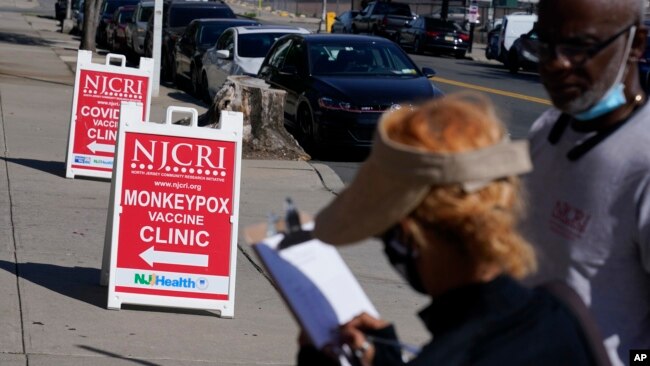我が国では、今コロナ第7波で揺れていて、サル痘を聞くことが少なくなっています。
VOAで、WHOレポートを聴いてみましょう!!
VOAで英語を学びましょう!!
WHO サル痘の患者数が全世界で21%減少 (和訳)
WHO: Monkeypox Cases Drop 21 Percent Worldwide
August 25, 2022
世界中で報告されたサル痘の症例数は、先週に比べ21%減少しました。この減少はヨーロッパでの流行が減少し始めた可能性を示すものであると、世界保健機関(WHO)が木曜日に発表しました。
国連の保健機関は、毎週新たに5907人の患者を報告しています。イランとインドネシアの2カ国が最初の患者を報告したと言います。4月下旬以降、98カ国で45,000件以上の症例が報告されています。
WHOは、アメリカ大陸での感染者が過去1ヶ月間の感染者の60%を占めたと発表しました。ヨーロッパでの感染者は約38パーセントであったと言います。アメリカ大陸の感染者は”急増している”と言います。
アフリカ疾病管理予防センターは木曜日に、アフリカ大陸では過去1週間に219件の新しいケースが報告されたと発表しました。これは54パーセントの急増です。そのほとんどはナイジェリアとコンゴで発生しているとのことです。
7月初旬、WHOのヨーロッパ局長は、実験室で確認されたサル痘の症例の90パーセントがこの地域の国々によるものであると述べています。
英国の保健当局は先週、同国のサル痘の発生が減速している”初期兆候”があると発表しています。
英国の健康安全局は先月、この病気がゲイやバイセクシュアル、あるいは他の男性とセックスした男性以外に広がっている証拠はないと発表しました。
ヨーロッパと北米でのサル痘の発生は5月に確認されました。それ以来、WHOや他の保健機関は、その広がりがほとんど男性とセックスをする男性にあると指摘しています。
サル痘はアフリカの一部で古くから存在しました。専門家は、スペインとベルギーの2つのパーティーでセックスを通じて感染が広がった後、ヨーロッパと北アメリカでの流行が始まったとみています。
WHOの最新報告によると、98%の症例が男性です。そのうちの大多数は、男性とセックスをする男性です。
WHOは、この病気のリスクが高い男性には、一時的にセックスの相手を減らすことを検討するよう勧告しています。
サル痘が広がるには、通常、患者の皮膚にあるlesions病変と呼ばれる感染部位に皮膚と皮膚、または皮膚と口が接触することが必要です。また、サル痘の病変を持つ人の衣服やベッドシーツに触れることでも感染することがあります。
世界的に見ても、サル痘ワクチンは限られています。米国、欧州、英国の当局者は、供給量を伸ばすために、ワクチンの投与量を減らし始めています。
WHOは、ワクチンがある国には、複数のセックスパートナーを持つゲイやバイセクシュアル男性など、この病気のリスクが高い人にまず予防接種を行うよう勧告しています。また、保健所職員や研究所職員など、流行抑制に関わる人々へのワクチン接種も勧めています。
アフリカでは、サル痘による死亡が最も多く報告されていますが、一般に入手可能なワクチンの供給はありません。唯一のワクチンは、コンゴでの研究調査で使用されています。
WHO: Monkeypox Cases Drop 21 Percent Worldwide
The number of monkeypox cases reported worldwide dropped by 21 percent in the last week. The drop marks a possible sign that the outbreak in Europe may be starting to decline, the World Health Organization (WHO) said Thursday.
The United Nations health agency reported 5,907 new weekly cases. It said two countries - Iran and Indonesia - reported their first cases. More than 45,000 cases have been reported in 98 countries since late April.
Cases in the Americas made up 60 percent of infections in the past month, the WHO said. Cases in Europe, it said, made up about 38 percent. It said infections in the Americas showed “a continuing steep rise.”
The Africa Centers for Disease Control and Prevention said Thursday the continent had 219 new cases reported in the past week. That is a jump of 54 percent. Most were in Nigeria and Congo, the agency said.
In early July, the WHO’s Europe director said countries in the region were responsible for 90 percent of all laboratory confirmed cases of monkeypox.
British health officials said last week that there were “early signs” the country’s monkeypox outbreak was slowing.
Britain’s Health Security Agency said last month there was no evidence the disease was spreading beyond men who were gay, bisexual or had sex with other men.
Monkeypox outbreaks in Europe and North America were identified in May. Since then, the WHO and other health agencies have noted that its spread was almost all in men who have sex with men.
Monkeypox has existed in parts of Africa for many years. Experts suspect the outbreaks in Europe and North America began after the disease started spreading through sex at two parties in Spain and Belgium.
WHO’s latest report said 98 percent of cases are in men. The large majority of those cases are in men who have sex with men.
The WHO has recommended that men at high risk of the disease temporarily consider reducing their number of sex partners.
Monkeypox usually requires skin-to-skin or skin-to-mouth contact with infected areas on a patient’s skin, called lesions, to spread. People can also become infected through contact with the clothing or bedsheets of someone who has monkeypox lesions.
Monkeypox vaccines worldwide are limited. Officials in the U.S., Europe and Britain have all begun decreasing the strength of the vaccine dose in order to stretch supplies.
The WHO has advised countries that have vaccines to offer the shots to people at high-risk for the disease first, including gay and bisexual men with several sex partners. They also advise vaccinating health workers and laboratory workers and others involved in controlling the outbreak.
While Africa has reported the most suspected deaths from monkeypox, the continent has no vaccine supplies available to the public. The only vaccines there are being used in a research study in Congo.
Words in This Story
decline –v. to become less, fewer or lower
steep –adj. rising or falling sharply
gay –adj. sexually attracted to the same sex
dose –n. the necessary amount of a medicine or vitamin taken at one time
